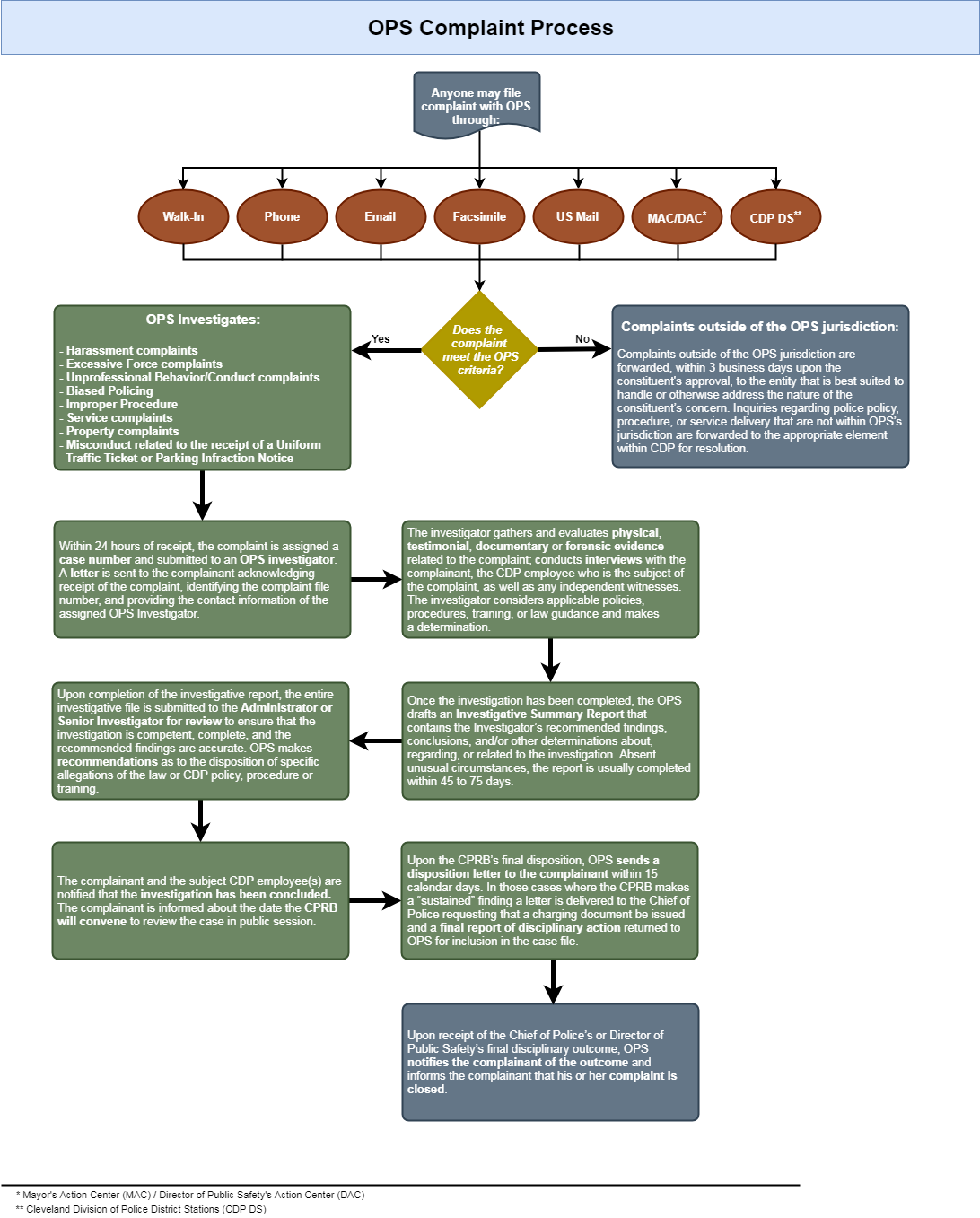Complaints
The Office of Professional Standards (OPS) has the responsibility of receiving and investigating non-criminal complaints filed by members of the public against sworn and non-sworn Cleveland Division of Police employees.
Citizen complaints may be filed in person at the Office of Professional Standards (OPS), or by U.S. mail, email, or facsimile to OPS. Citizen complaints may also be filed at the Cleveland Division of Police (CDP) Headquarters, any of the five (5) CDP District Stations, Cleveland City Hall, or Director of Public Safety’s Action Center (DAC). All citizen complaints are identified by an OPS file tracking number and then assigned to a civilian Investigator.

Once a file tracking number is designated and the complaint is assigned to a civilian investigator, a preliminary review is conducted. If during the preliminary review it is determined that potential criminal conduct or activity may have occurred, then OPS refers the complaint to the Internal Affairs Unit of CDP. If there is no alleged criminal conduct or activity, then OPS will conduct the investigation. During the course of the investigation, the complainant and any potential witnesses are interviewed, and the assignment and duty reports of the Officer(s) involved, as well as all relevant documentation, are reviewed. The Officer(s) involved is required to respond to the allegations contained in the complaint.
At the conclusion of the investigation, it is reviewed and approved by the OPS Administrator, who then forwards it to the Civilian Police Review Board (CPRB). The CPRB reviews all completed investigations conducted by OPS, deliberates, and then determines if a civil violation of policy, training, or rules and regulations occurred. If the CPRB determines that a violation did occur, then it sustains the complaint and accordingly recommends the appropriate discipline to either the Chief of Police or the Director of Public Safety.
When the CPRB recommends discipline, a pre-disciplinary hearing is conducted in which OPS presents its investigation to either the Chief of Police or the Director of Public Safety, or his designated hearing officer. The Officer(s) involved, who is present along with his/her union representative(s), has the opportunity to respond to the charges filed against him/her. The Chief of Police or the Director of Public Safety makes the final decision whether or not to impose discipline against the Officer(s) who was the subject of the citizen complaint.
Jurisdiction
OPS has jurisdiction over the following types of misconduct complaints made against personnel of the Cleveland Division of Police:
- Harassment complaints: to include those alleging bias policing, discrimination, and profiling;
- Excessive Force complaints;
- Unprofessional Behavior/Conduct complaints;
- Improper Procedure complaints, including:
- Improper Arrest
- Improper Citations
- Improper Search
- Improper Stop
- Improper Tow
- Service complaints, including:
- Insufficient CDP employee service
- No CDP service;
- Property complaints, including
- missing property
- damage to property; and,
- Misconduct related to the receipt of a Uniform Traffic Ticket (UTT) or Parking Infraction Notice (PIN) if the Parking Infraction Notice was issued by CDP personnel.
Cases that fall outside of these parameters, and do not allege criminal conduct, are administratively dismissed and referred to the proper agency with the authority to address that matter, whenever possible. Citizen complaints alleging criminal conduct (i.e. theft, assault) are referred by the OPS Administrator to the CDP Internal Affairs Unit that has the responsibility for investigation of alleged criminal acts by CDP personnel.
Investigations
The complaint investigative process strives to provide complainants with a thorough, impartial, objective, and timely avenue for review of their grievances against CDP employees, and at the same time protect Division employees from false allegations of misconduct or wrongdoing.
In an effort to maintain the integrity of the investigative process, precise procedures have been established for the receipt, investigation, and adjudication of misconduct complaints.
In addition to the receipt and processing of a complaint, the investigation will typically involve the gathering of testimonial evidence, documentary evidence (reports, photographs, etc.), physical or forensic evidence.
Physical evidence may include such things as objects, fingerprints, footprints, handprints, or marks left behind by tools or weapons. Forensic evidence may include such things as bruises or bite marks.
Testimonial evidence is gathered by taking statements or conducting recorded interviews from the complainant who filed the complaint and all witnesses who may have factual information pertaining to the complaint. Statements may also be taken from persons who have specialized knowledge regarding the complaint or the circumstances related to the complaint. Officers and other personnel will be interviewed in most circumstances as well.
In addition to the gathering of physical and testimonial evidence, Investigators will also seek to gather documentary evidence such as reports, activity sheets, 911 calls, dispatch reports, crime scene materials, as well as video or audio recordings that may be related to the complaint.